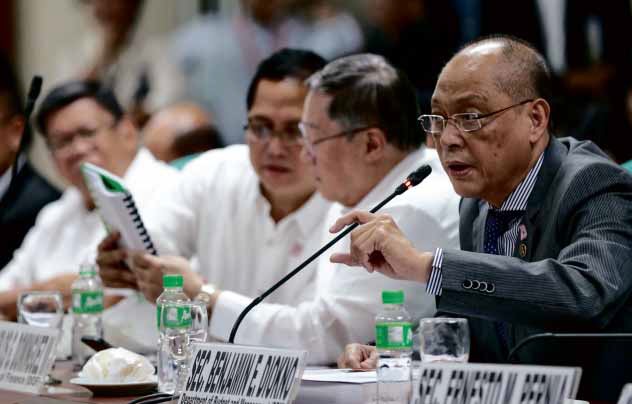Lacson sees pork in budget

BUDGETHEARING Budget Secretary Benjamin Diokno defends the proposed 2017 National Expenditure Program during a hearing of the Senate committee on finance. Beside him is Finance Secretary Carlos Dominguez. LYN RILLON
IF IT is a “budget for real change,” why are legislators allowed to pitch projects in an expenditure plan they themselves would vet and authorize?
Sen. Panfilo Lacson on Tuesday raised this point, noting that the arrangement brings back the graft-ridden pork barrel, public funds for the pet projects of lawmakers.
Lacson vowed to delete project proposals that several lawmakers had made to the Department of Budget and Management (DBM) after Malacañang allowed them to each submit projects worth a total of P80 million to be included in the draft P3.35-trillion National Expenditure Program (NEP) for 2017.
“That should be scrapped. It should be reappropriated to the agencies so that legislators will not be able to meddle with the function of the executive. It should be stopped,” Lacson told reporters on Tuesday.
During a budget briefing at the Senate, Lacson confronted Budget Secretary Benjamin Diokno with the administration’s new budget mechanism, under which each member of the House of Representatives was asked to propose their respective projects worth P80 million.
Article continues after this advertisementP24B for lawmakers’ projects
Article continues after this advertisementBy Lacson’s estimate, up to P24 billion has been made available for lawmakers’ projects.
The senator has yet to find out how many House members submitted proposals, but he believes the projects might be hidden in various agencies, such as the public works, agriculture and health departments.
“That is an encroachment of the functions of the executive branch. So clearly, there’s possible conflict of interest. We will be the ones to vet the budget submitted by the executive branch. So how will they remove or question their own P80-million budget?” he said in an interview.
Lacson said he was glad none of the senators had submitted their own proposals.
Return of pork
For Lacson, this was a seeming return to the discretionary Priority Development Assistance Fund (PDAF) or pork barrel, which the Supreme Court had ruled unconstitutional in 2013.
“It’s like we’re going back to PDAF, because why would legislators identify projects? They will be the ones to administer the budget and mind where to allocate the funds,” he said.
“That’s why I told him (Diokno) not to ask the President to veto my amendments (to delete the lawmakers’ proposals) should these be accepted, because I intend to identify those submissions and have them deleted,” Lacson said.
During the hearing, Lacson called the system an “intervention” by the same people supposed to examine and authorize the budget.
“Why do the congressmen have intervention in the NEP? It is clear that the preparation of the national budget is the exclusive domain of the executive branch… Is this constitutional? Is this legal? Is that compliant with jurisprudence?” Lacson asked Diokno, in reference to the 2013 high court ruling on PDAF.
Diokno said the ruling was “very clear” that it was “post-operative” and that lawmakers may not seek funding for projects when the budget had already been approved.
The budget secretary said the proposed NEP was not yet finished when the proposals were sought.
“I am not saying that legislators should meddle with the NEP. What I’m saying is if the project is worthwhile, then you should listen to the congressman. You as a congressman are entitled to approach a secretary before the budget is passed,” Diokno told Lacson.
He said projects not aligned with the Duterte administration’s priorities would not be approved anyway, “like basketball courts or waiting sheds.”
Diokno also reminded Lacson that he was among petitioners against the PDAF and the Disbursement Acceleration Program (DAP), an Aquino administration stimulus program stricken down as unconstitutional in 2014.
“You know very well I’m one of the petitioners in the PDAF and DAP, so I won’t be guilty of the same hypocrisy done in the past,” Diokno said.
Conflict of interest
Lacson then pointed out that the funding mechanism constituted conflict of interest.
“Isn’t that clear conflict of interest, because they are involved in the authorization phase? How will they participate in the amendments when their own projects are in that proposed budget?” he asked.
“In oversight, how will they have objectivity when the budget includes their own projects?” he continued, adding that he had a serious issue about the funding mechanism.
Sen. Juan Edgardo Angara sought to clarify the matter, explaining the “crucial difference” between the new system and the previous mechanism of providing discretionary funds.
Under the new arrangement, Angara said the executive was not obligated to accept all proposals. “That is the difference between a right and a suggestion,” he said.
But Lacson noted that it did not matter when the projects were proposed—if it was post-enactment or pre-enactment.
“It doesn’t make any difference. What’s important here is that the legislator should not meddle with the function of the executive,” the senator said.